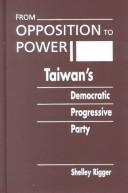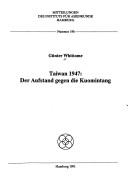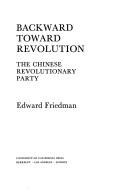| Listing 1 - 10 of 13 | << page >> |
Sort by
|
Book
Abstract | Keywords | Export | Availability | Bookmark
 Loading...
Loading...Choose an application
- Reference Manager
- EndNote
- RefWorks (Direct export to RefWorks)
Jia ye tang (China) --- China --- Imprints
Book
ISBN: 9579005222 Year: 1991 Publisher: 臺北 漢美
Abstract | Keywords | Export | Availability | Bookmark
 Loading...
Loading...Choose an application
- Reference Manager
- EndNote
- RefWorks (Direct export to RefWorks)
Private libraries --- History --- Qi, Chengye, --- Library. --- Dan sheng tang (China) --- History.

ISBN: 158826162X 9781588261625 1555879691 9781555879693 Year: 2001 Publisher: Boulder L. Rienner Publishers
Abstract | Keywords | Export | Availability | Bookmark
 Loading...
Loading...Choose an application
- Reference Manager
- EndNote
- RefWorks (Direct export to RefWorks)
On March 18, 2000, Taiwan's voters stunned the world by choosing Chen Shui-bian, the candidate of the opposition Democratic Progressive Party (DPP), to be their president. A host of new issues quickly became the subject of debate. What is the DPP? Where did it come from and what does it stand for? How will it use its newly won power? Will it risk war with mainland China in pursuit of independence? Addressing these questions, From Opposition to Power provides a comprehensive overview of the DPP, its history, policies, and structure. Rigger traces the party's origins in opposition movements of the 1960s and 1970s and recounts how it was founded in defiance of martial law in 1986. She then analyzes its internal conflicts over policy and power and explains the party's changing stance on such issues as Taiwan's independence, international relations, and economic policy. A key theme is the role the DPP has played in promoting democratization and fair competition in Taiwan. The first book in English to focus on this influential new power, Rigger's study is a must read for those hoping to understand and anticipate events in East Asia.
Min jin dang (Taiwan) --- Min chin tang (China) --- Min jin dang (China) --- Min zhu jin bu dang (Taiwan) --- Demokratische Fortschrittspartei (Taiwan) --- Democratic Progressive Party (Taiwan) --- DPP (Taiwan) --- Democratic Progressive Party of Taiwan --- Minshu Shinpotō (Taiwan) --- 民進黨 (Taiwan) --- 民进党 (Taiwan) --- Taiwan --- Politics and government --- S26/0600 --- S26/0607 --- Taiwan--Politics and government: since 1945 --- Taiwan--Opposition movement and parties --- POLITICAL SCIENCE / World / Asian.
Book
ISBN: 1108169236 1108164617 1108174035 110719623X 1316647226 Year: 2018 Publisher: Cambridge : Cambridge University Press,
Abstract | Keywords | Export | Availability | Bookmark
 Loading...
Loading...Choose an application
- Reference Manager
- EndNote
- RefWorks (Direct export to RefWorks)
In this ambitious examination of the complex political culture of China under Guomindang rule, Brian Tsui interweaves political ideologies, intellectual trends, social movements and diplomatic maneuvers to demonstrate how the Chinese revolution became conservative after the anti-Communist coup of 1927. Dismissing violent struggles for class equality as incompatible with nationalist goals, Chiang Kai-shek's government should, Tsui argues, be understood in the context of the global ascendance of radical right-wing movements during the inter-war period. The Guomindang's revolutionary nation-building and modernization project struck a chord with China's reformist liberal elite, who were wary of mob rule, while its obsession with Eastern spirituality appealed to Indian nationalists fighting Western colonialism. The Nationalist vision was defined by the party-state's hostility to communist challenges as much as by its ability to co-opt liberalism and Pan-Asianist anti-colonialism. Tsui's revisionist reading revisits the peculiarities of the Guomindang's revolutionary enterprise, resituating Nationalist China in the moment of global radical right ascendancy.
China --- History --- Politics and government --- Zhongguo guo min dang. --- Zhong guo guo min dang --- Chung-kuo kuo min tang --- Chūgoku Kokumintō --- 中国国民党 --- 中國國民黨 --- Guo min dang (China) --- Kuo min tang (China) --- Guomindang (China) --- Kuomintang (China) --- Gominʹdan (China) --- Kū maṅʻ tanʻ (China) --- 國民黨 (China) --- 国民党 (China) --- Zhonghua ge ming dang --- 中華革命黨 --- Chinese Nationalist Party --- Nationalist Party (China) --- Republican Party (China) --- Soi︠u︡z vozrozhdenii︠a︡ Kitai︠a︡ --- Partido Nacionalista Chino --- Obʺedinennai︠a︡ revoli︠u︡t︠s︡ionnai︠a︡ liga Kitai︠a︡ --- Gomindanovskai︠a︡ partii︠a︡ (China) --- Chūkatō --- KMT --- Zhongguo tong meng hui

ISBN: 3889100902 Year: 1991 Volume: 196 Publisher: Hamburg : Institut für Asienkunde Hamburg,
Abstract | Keywords | Export | Availability | Bookmark
 Loading...
Loading...Choose an application
- Reference Manager
- EndNote
- RefWorks (Direct export to RefWorks)
Chung-kuo kuo min tang --- History --- Histoire --- Taiwan --- Politics and government --- Politique et gouvernement --- S26/0510 --- S26/0607 --- S26/0600 --- S26/0605 --- Taiwan--History: since 1945 --- Taiwan--Opposition movement and parties --- Taiwan--Politics and government: since 1945 --- Taiwan--Guomindang: since 1945 (incl. party congresses) --- Chung-kuo kuo ming tang --- -S26/0510 --- -Zhongguo guo min dang --- History. --- Zhongguo guo min dang --- Zhongguo guo min dang. --- Zhong guo guo min dang --- Chūgoku Kokumintō --- 中国国民党 --- 中國國民黨 --- Guo min dang (China) --- Kuo min tang (China) --- Guomindang (China) --- Kuomintang (China) --- Gominʹdan (China) --- Kū maṅʻ tanʻ (China) --- 國民黨 (China) --- 国民党 (China) --- Zhonghua ge ming dang --- 中華革命黨 --- Chinese Nationalist Party --- Nationalist Party (China) --- Republican Party (China) --- Soi︠u︡z vozrozhdenii︠a︡ Kitai︠a︡ --- Partido Nacionalista Chino --- Obʺedinennai︠a︡ revoli︠u︡t︠s︡ionnai︠a︡ liga Kitai︠a︡ --- Gomindanovskai︠a︡ partii︠a︡ (China) --- Chūkatō --- KMT --- Zhongguo tong meng hui

ISBN: 0520024311 Year: 1974 Publisher: Berkeley, Calif. University of California Press
Abstract | Keywords | Export | Availability | Bookmark
 Loading...
Loading...Choose an application
- Reference Manager
- EndNote
- RefWorks (Direct export to RefWorks)
History of Asia --- anno 1900-1999 --- China --- 812 Ideologie --- 815 Geschiedenis --- 841.3 Politieke bewegingen --- 841 Politiek Bestel --- 858.1 Politiek geweld --- 883.2 Oost-Azië --- Zhongguo guo min dang. --- Zhong guo guo min dang --- Chung-kuo kuo min tang --- Chūgoku Kokumintō --- 中国国民党 --- 中國國民黨 --- Guo min dang (China) --- Kuo min tang (China) --- Guomindang (China) --- Kuomintang (China) --- Gominʹdan (China) --- Kū maṅʻ tanʻ (China) --- 國民黨 (China) --- 国民党 (China) --- Zhonghua ge ming dang --- 中華革命黨 --- Chinese Nationalist Party --- Nationalist Party (China) --- Republican Party (China) --- Soi︠u︡z vozrozhdenii︠a︡ Kitai︠a︡ --- Partido Nacionalista Chino --- Obʺedinennai︠a︡ revoli︠u︡t︠s︡ionnai︠a︡ liga Kitai︠a︡ --- Gomindanovskai︠a︡ partii︠a︡ (China) --- Chūkatō --- KMT --- Zhongguo tong meng hui --- Politics and government
Book
ISBN: 1684175720 0674970608 Year: 2017 Publisher: Cambridge, Massachusetts : Harvard University Asia Center,
Abstract | Keywords | Export | Availability | Bookmark
 Loading...
Loading...Choose an application
- Reference Manager
- EndNote
- RefWorks (Direct export to RefWorks)
"This in-depth study of Nationalist tariff policy fundamentally challenges the widely accepted idea that the key to the Communist seizure of power in China lay in the incompetence of Chiang Kai-shek's Nationalist government. It argues instead that during the second Sino-Japanese War, China's international trade, the government's tariff revenues, and its fiscal policy and state-making project all collapsed."--
Sino-Japanese War, 1937-1945 --- Tariff --- Ad valorem tariff --- Border taxes --- Customs (Tariff) --- Customs duties --- Duties --- Fees, Import --- Import controls --- Import fees --- Tariff on raw materials --- Commercial policy --- Indirect taxation --- Revenue --- Customs administration --- Favored nation clause --- Non-tariff trade barriers --- Reciprocity (Commerce) --- Economic aspects --- History --- Zhongguo guo min dang. --- Zhong guo guo min dang --- Chung-kuo kuo min tang --- Chūgoku Kokumintō --- 中国国民党 --- 中國國民黨 --- Guo min dang (China) --- Kuo min tang (China) --- Guomindang (China) --- Kuomintang (China) --- Gominʹdan (China) --- Kū maṅʻ tanʻ (China) --- 國民黨 (China) --- 国民党 (China) --- Zhonghua ge ming dang --- 中華革命黨 --- Chinese Nationalist Party --- Nationalist Party (China) --- Republican Party (China) --- Soi︠u︡z vozrozhdenii︠a︡ Kitai︠a︡ --- Partido Nacionalista Chino --- Obʺedinennai︠a︡ revoli︠u︡t︠s︡ionnai︠a︡ liga Kitai︠a︡ --- Gomindanovskai︠a︡ partii︠a︡ (China) --- Chūkatō --- KMT --- Zhongguo tong meng hui --- China --- Commerce --- Economic policy
Book
ISBN: 3036558284 3036558276 Year: 2022 Publisher: Basel MDPI - Multidisciplinary Digital Publishing Institute
Abstract | Keywords | Export | Availability | Bookmark
 Loading...
Loading...Choose an application
- Reference Manager
- EndNote
- RefWorks (Direct export to RefWorks)
This book focuses on the traditional Chinese ritual system of sacrifice to mountain and water spirits, a significant but largely overlooked sub-field of Chinse religious studies. This system mainly comprised the five sacred peaks, five strongholds, four seas, and four waterways, and was maintained for two thousand years in imperial China. As state ritual, it was constructed of by Confucian ritual culture, but in practice, it gradually interacted and integrated with various religious traditions, such as Daoism, Buddhism, and folk belief, especially in its local manifestation and dissemination. The eighteen great mountains and waters marked geographical and directional borders and territories modelled on the yin-yang and five-phase framework that helped shape Chinese people’s cosmographical understanding of the world. Together, they constituted a set of sacred spaces symbolizing the sanctioned political legitimacy of the imperium and functioning as the loca for communication with the divine, as well as the media between religion and its secular context, state ideology and local beliefs, or various ethnic groups. Through the discovery of a rich variety of historical sources, especially stele inscriptions preserved in the sacrificial temples, the contributors of the ten chapters in this volume examine the sacred peaks, strongholds, seas, and waterways respectively. While each of the chapters explores one or more perspectives, together they reveal the rich implications and ramification of the ritual system and present the first comprehensive study of this sub-field.
Religion & beliefs --- five sacred peaks --- five strongholds --- four seas --- four waterways --- state ritual system of sacrifice --- Chinese religion --- Chinese historical geography --- South Sea God --- state sacrificial ritual --- Zhang Jiuling --- Zhang Jiuzhang --- Zhang Jiugao --- Tang dynasty --- Buddhism --- Mount Yi --- Eastern Stronghold Temple --- state sacrifice --- Daoism --- Complete Perfection Daoism --- early Chinese poetry --- medieval Chinese poetry --- rivers --- fu (rhapsody) --- Milky Way --- noble titles --- mountain and water spirits --- Tang era --- Mount Yiwulü --- Northern Stronghold --- Beizhen --- ethnic minority in northern China --- legitimacy of political regime --- the Yangzi River --- water spirits --- official sacrifice --- codes of state ritual --- imperial power --- Tang China --- Sima Chengzhen --- shrines for the perfected lords of the five sacred peaks --- sacred river --- Jidu --- state ritual system --- political legitimacy --- religious practice --- imperial China --- the South Sea God --- sacrificial ritual --- national god --- folk god --- localization
Book
ISBN: 9781501762222 1501762222 9781501762239 1501762230 Year: 2022 Publisher: Ithaca ; London : Cornell University Press,
Abstract | Keywords | Export | Availability | Bookmark
 Loading...
Loading...Choose an application
- Reference Manager
- EndNote
- RefWorks (Direct export to RefWorks)
"In Diasporic Cold Warriors, Chien-Wen Kung explains how the Chinese Nationalist Party (Kuomintang) sowed the seeds of anticommunism among the Philippine Chinese with the active participation of the Philippine state.From the 1950s to the 1970s, Philippine Chinese were Southeast Asia's most exemplary Cold Warriors among overseas Chinese. During these decades, no Chinese community in the region was more vigilant in identifying and rooting out suspected communists from within its midst; none was as committed to mobilizing against the People's Republic of China as the one in the former US colony. Ironically, for all the fears of overseas Chinese communities' ties to the PRC at the time, the example of the Philippines shows that the "China" that intervened the most extensively in any Southeast Asian Chinese society during the Cold War was the Republic of China on Taiwan.For the first time, Kung tells the story of the Philippine Chinese as pro-Taiwan, anticommunist partisans, tracing their evolving relationship with the KMT and successive Philippine governments over the mid-twentieth century. Throughout, he argues for a networked and transnational understanding of the ROC-KMT party-state and demonstrates that Taipei exercised a form of nonterritorial sovereignty over the Philippine Chinese with Manila's participation and consent. Challenging depoliticized narratives of cultural integration, he also contends that, because of the KMT, Chinese identity formation and practices of belonging in the Philippines were deeply infused with Cold War ideology.Drawing on archival research and fieldwork in Taiwan, the Philippines, the United States, and China, Diasporic Cold Warriors reimagines the histories of the ROC, the KMT, and the Philippine Chinese, connecting them to the broader canvas of the Cold War and postcolonial nation-building in East and Southeast Asia."-
Chinese --- Anti-communist movements --- Anti-communist resistance --- Underground, Anti-communist --- Communism --- Ethnology --- Political activity --- History --- Zhongguo guo min dang. --- KMT-ROC party-state, Huaqiao, cold war in southeast Asia, cold war in east Asia, KMT Southeast Asia, KMT Cold War Taiwan. --- Zhong guo guo min dang --- Chung-kuo kuo min tang --- Chūgoku Kokumintō --- 中国国民党 --- 中國國民黨 --- Guo min dang (China) --- Kuo min tang (China) --- Guomindang (China) --- Kuomintang (China) --- Gominʹdan (China) --- Kū maṅʻ tanʻ (China) --- 國民黨 (China) --- 国民党 (China) --- Zhonghua ge ming dang --- 中華革命黨 --- Chinese Nationalist Party --- Nationalist Party (China) --- Republican Party (China) --- Soi︠u︡z vozrozhdenii︠a︡ Kitai︠a︡ --- Partido Nacionalista Chino --- Obʺedinennai︠a︡ revoli︠u︡t︠s︡ionnai︠a︡ liga Kitai︠a︡ --- Gomindanovskai︠a︡ partii︠a︡ (China) --- Chūkatō --- KMT --- Zhongguo tong meng hui
Book
ISBN: 1283847183 0739174789 9780739174784 9780739174777 9780739174784 0739174770 9781283847186 Year: 2013 Publisher: Lanham, Md.
Abstract | Keywords | Export | Availability | Bookmark
 Loading...
Loading...Choose an application
- Reference Manager
- EndNote
- RefWorks (Direct export to RefWorks)
This book focuses on the KMT's reputation for economic management, democratization and good leadership that made its return to power in 2008 possible. The opposition Democratic Progressive Party's corruption was also a factor. The KMT seems ready to continue to rule for some time suggesting short turnovers in ruling parties unlikely.
Elections --- Political parties --- Zhongguo guo min dang. --- Zhongguo tong meng hui --- Zhong guo guo min dang --- Chung-kuo kuo min tang --- Chūgoku Kokumintō --- 中国国民党 --- 中國國民黨 --- Guo min dang (China) --- Kuo min tang (China) --- Guomindang (China) --- Kuomintang (China) --- Gominʹdan (China) --- Kū maṅʻ tanʻ (China) --- 國民黨 (China) --- 国民党 (China) --- Zhonghua ge ming dang --- 中華革命黨 --- Chinese Nationalist Party --- Nationalist Party (China) --- Republican Party (China) --- Soi︠u︡z vozrozhdenii︠a︡ Kitai︠a︡ --- Partido Nacionalista Chino --- Obʺedinennai︠a︡ revoli︠u︡t︠s︡ionnai︠a︡ liga Kitai︠a︡ --- Gomindanovskai︠a︡ partii︠a︡ (China) --- Chūkatō --- KMT --- Taiwan --- Politics and government --- S26/0605 --- Taiwan--Guomindang: since 1945 (incl. party congresses) --- Taiwan Sheng zheng fu --- Tʻai-wan sheng cheng fu --- Taiwan xing zheng zhang guan gong shu --- Tʻai-wan hsing cheng chang kuan kung shu --- Taiwan Sheng xing zheng zhang guan gong shu --- Tʻai-wan sheng hsing cheng chang kuan kung shu --- Tʻai-wan --- Taĭvan --- Formosa --- Taiwan Sōtokufu --- Government-General of Taiwan --- Taiwan sheng --- Tʻai-wan sheng --- Taiwan Provincial Government --- Taiwan zong du fu --- Tʻai-wan tsung tu fu --- Xiaoliuqiu --- 臺灣 --- 台灣 --- Тайвань --- Tajvan --- Тайуан --- Taĭuan --- Tayiwani --- Taywan --- Taivanas --- Taiwana --- Taihuan --- Тайван --- China (Republic : 1949- )
| Listing 1 - 10 of 13 | << page >> |
Sort by
|

 Search
Search Feedback
Feedback About UniCat
About UniCat  Help
Help News
News